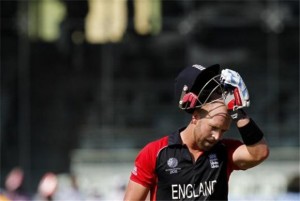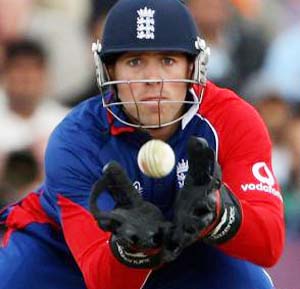
A gradual but inevitable descent into cricket-based loathing and bile.
The ‘keepers Part Three: Matt Prior
By Scaloni
Players like Matt Prior don’t come along very often. In England’s last five Test series, he has scored 996 runs at an average of over 55. Take into account that his strike rate last summer was 89 and you’ve got a pretty clear picture of a Test number seven at the peak of his powers. If he were a specialist batsman, he would be well ahead of Eoin Morgan in the pecking order. That he has also improved to the extent that he now has to be considered one of the best specialist wicketkeepers in world cricket, and certainly far and away the best wicketkeeper-batsmen in Test cricket, is testament to the level of hard work and self-improvement that he has put in to his role since he was dropped for Tim Ambrose nearly four years ago.
A man with Prior’s considerable talent, and particularly his ability to demolish attacks with powerful hitting and inventive shots lower down the order, should in theory have had a glowing ODI career up to this point. You only need to look at MS Dhoni’s perfection of the role he has made for himself in the Indian side, and compare Prior’s abilities with Dhoni’s, to see there really ought not be a great deal of difference between their records.
But there is. In 62 innings for England, Prior has managed a meagre average of just 24.18 with just three half centuries in a career that has spanned seven years all together.
During Prior’s recent Test exploits, his role has largely involved coming in to bat at a time when the team need quick runs to move the game along, and he has been able to do this sensationally well. What is it about limited overs international cricket that has thus far meant such exploits have eluded him in that form of the game? And is his lack of success in the game something which can be fixed?
For this writer, it comes down to three very simple things.
1. Batting Position
In December 2004, Prior made his ODI debut in Bulawayo, opening the batting with Michael Vaughan. In his 62 innings since then, 36 have come as an opener. For the 2009 Australia series, he was inexplicably given the number 3 spot, seemingly because of the lack of anyone else being prepared to do it rather than any great plan. And naturally, his game has suffered as a result. He is not a top order player and he never will be. If Dhoni were promoted to open regularly, he would most likely struggle as well. Facing a new ball and a fresh attack is the game of neither of those players, and Prior has been wasted in that role for the vast majority of his international limited overs career. As with Dhoni, he is a player suited to coming in with 15-20 overs to go and creating havoc against a tiring attack. Give Prior an extended run there, and you may see that average begin to slide up a little.
2. Improvement Of Personal Game
Prior has been in the one-day frame for seven years now. Anyone who has followed his career closely will have noticed that the Matt Prior of today is a very different beast from the Matt Prior of 2004. And even the Matt Prior of 2008. His Test form since Spring of last year has so far outshone everything that went before that it is sometimes easy to forget he has not always been so consistent.
During those 18 months, he has been selected for England’s ODI side just 13 times. All of them between January and March of this year, and almost all as an opener. We have a player who has turned himself into one of the best attacking batsmen on the planet, not to mention our most capable gloveman, and we’re not using him in the shortened form of the game.
3. Stability
A wider problem with England’s one-day side for as long as any of us can remember has been the revolving door of specialist death bowlers, all-rounders with no discernible talent in either discipline, wicketkeepers who can bat a bit, batsmen who can keep wicket a bit and fat club cricketers with a couple of decent county figures behind them. All have had their moment in the sun. So many have been completely hopeless.
Since Prior’s debut, Chris Read, Marcus Trescothick, Geraint Jones, Paul Nixon, Phil Mustard, Tim Ambrose and Steve Davies have all been given a go behind the stumps. Our attitude to Test cricket seems to be built on knowing our best players and investing time and effort into building them into great players. Our attitude to one-day cricket seems to be the opposite, and Prior is one of the most obvious casualties of this failing during his career.Give the man the number six spot, back his extraordinary talent, and watch him finally reach his potential in the shorter form of the game.
Given the above, it seems to me very counter-productive to write Prior off on the weakness of his batting record up to this point. Whilst cricket is a game where statistics can shine light on all manner of things, Prior is the perfect example of their failings. ‘24.18’ as a solitary figure fails to express Prior’s devasting recent form. It says nothing of him constantly being played out of position to plug gaps elsewhere in the side. And it does not tell the story of a one-day career whose only consistency has been in its chaos.
In Cook and Trott, we have two men tailor-made to open for their country. In Matt Prior, we have a number six batsman who can finally put a stop to our wicketkeeping merry-go-round and bring to the ODI side the sort of punishing lower-order innings that have defined his recent test career.
England’s one-day side will be in a much better position when we finally choose to use one of our most potent weapons in his proper role.




No Comments
Post a Comment